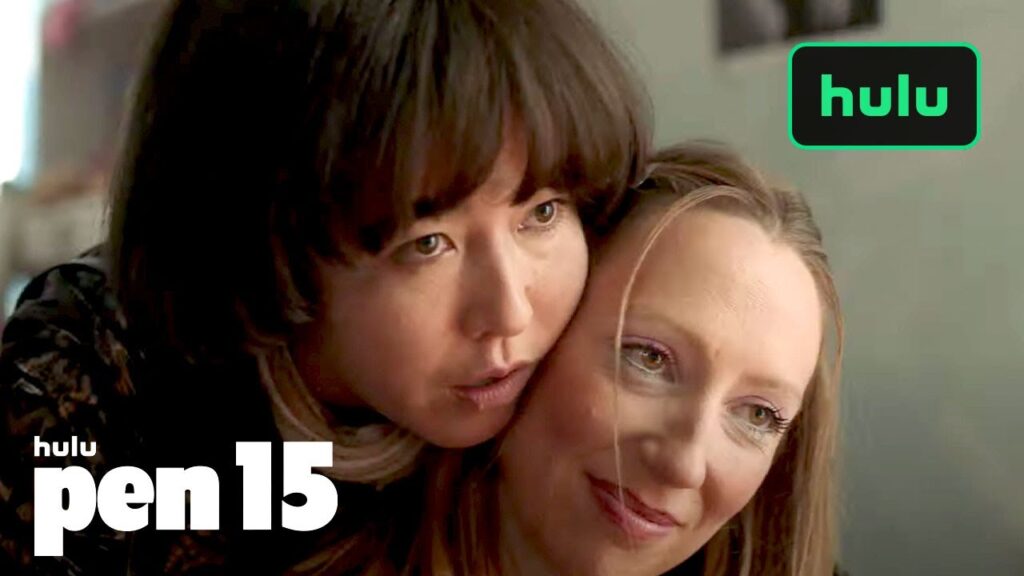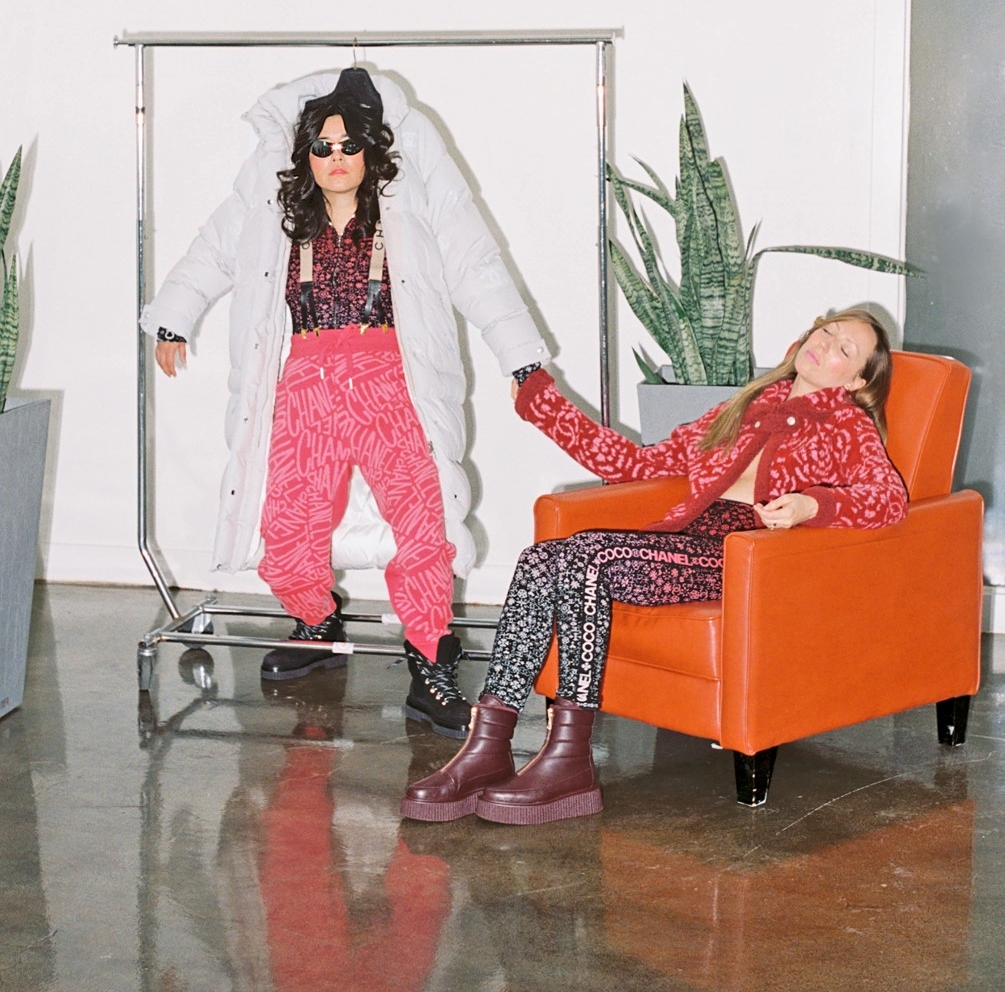
MAYA ERSKINE &
ANNA KONKLE
Iconic duo
of
PEN15
chats with
LAURA ALBERT
Photography Maya Fuhr
Fashion Editor Deborah Ferguson
“You must watch PEN15!” I’ve found myself fervently pleading to the uninitiated. The convert I’ve targeted invariably asks, So what’s it about? As soon as I explain, “Well, two women in their thirties play 13-year-olds in the year 2000,” I then assure them, you’ve never seen a take quite like this one, where the traumatic territory of adolescence is mined for humor while managing to avoid transgression and sentimentality. Maya Erskine and Anna Konkle, the creators and co-stars of PEN15, are so committed to their roles that it’s easy to forget you are actually watching adult women navigate 7th grade, surrounded by a teen cast. The cognitive dissonance adds to their outsider status in the ruthless popularity hierarchy of middle school. Adding to their travails, Maya, who is mixed race, endures microaggressions, while Anna is the go-between in her parents’ messy divorce. But the way they locate and bolster one another is the constant glorious beating heart of PEN15.
This is the end of the PEN15 series, as Maya and Anna leave us with the open-ended hope for their continued friendship.
In real-life both women have entered motherhood only months apart, and Reddit groups are already fantasizing of MOM30 possibilities. But to quote the closing line from the film Stand by Me, “I never had any friends later on like the ones I had when I was 12. Jesus, does anyone?”
Laura Albert interviews Anna Konkle & Maya Erskine of PEN15 for ContentMode
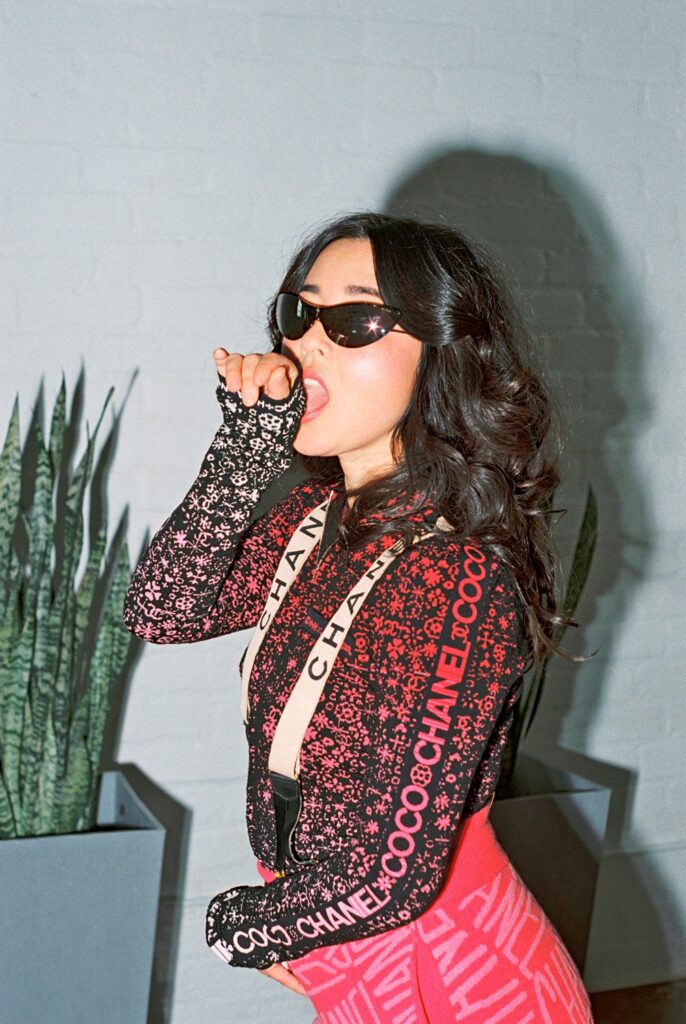
Sunglasses: Tom Ford for Gucci at Tab Vintage, Suspenders: CHANEL at Tab Vintage, Sweater and Knit Pants CHANEL
It’s something that is going to keep healing us for years. As time goes on, the processing and looking back, I’m still learning some things even after having made it. While making it you’re so in the throes of production that you’re kind of not realizing how much you’re absorbing or what is going through you as you make the show. As days pass, I’m like, OH! I get hit every week or so by something when I examine it or read an article about it or talk to someone like you about it. This is going to be a very special gift for us, the kind that keeps opening up new revelations and catharsis. I read an article the other day about that, it brought a new healing to my identity that I never really felt even while making it. But through making it, it brought us there, and so thank you also for sharing.
Deborah Ferguson: Hi this is Deborah, thank you so much for that beautiful shoot!
Anna Konkle: We had so much fun! We had such a great time, thank you, it was so fun doing – it was so weird in the way that Maya and I actually are! It was so fun, we loved it.
Maya Erskine: It was fun that we got to go wild!

Left: Puffa coat, Sweater, knit pants and Boots CHANEL, Suspenders CHANEL at Tab Vintage, Sunglasses Gucci at Table Vintage; Right: Knit cardigan and knit leggings: CHANEL, Boots Tamara Mellon
Laura Albert: It’s weird now, being in this in-between state variants and boosters. Maya and Anna, you both have babies. We had a little window of almost normal before the new variant, there are still invitations to events, how are you managing?
Anna: I don’t know. It’s like we’re getting back to life, then there is the new variant. I’m so anxious again because we both have unvaccinated babies. This back and forth of being like, We can’t live our life like this, and then I do something – I go out to dinner or go outside my box – and the next day I’m so anxious until the fourth negative Covid test. But those moments of normalcy and people together… I guess the silver lining, which is not very silver, is that it really makes you appreciate the human nature of being together, how nice that feels even if someone has social anxiety. You realize, okay, I crave that on a fundamental level.
One of the things that I admire about Maya, which we wanted to infuse the show with, is that, when there’s truth involved and we’re trying to hold up a mirror to our memories and the truth of a full human, that means that our main characters can’t be… that it’s okay for them to fuck up, and it’s okay for them to, at moments in a story, be the villains – even though they’re our protagonists. Because that’s the compassion, every character has the capacity to do the wrong thing in moments – whatever that means. I think that’s the journey I’m still on as an adult. And the metaphor of playing 13, that these things we’re dealing with now have always been there, and disliking the parts of yourself that aren’t pristinely good, whatever that means, and sort of rewriting to the reject parts of ourselves, who are beautiful and acceptable, and the things that I’ve hidden, which may make some people cringe – we’re going to celebrate the fact that we’re the main characters in this TV show and not apologize for it. I think we took that to a further extreme this season.
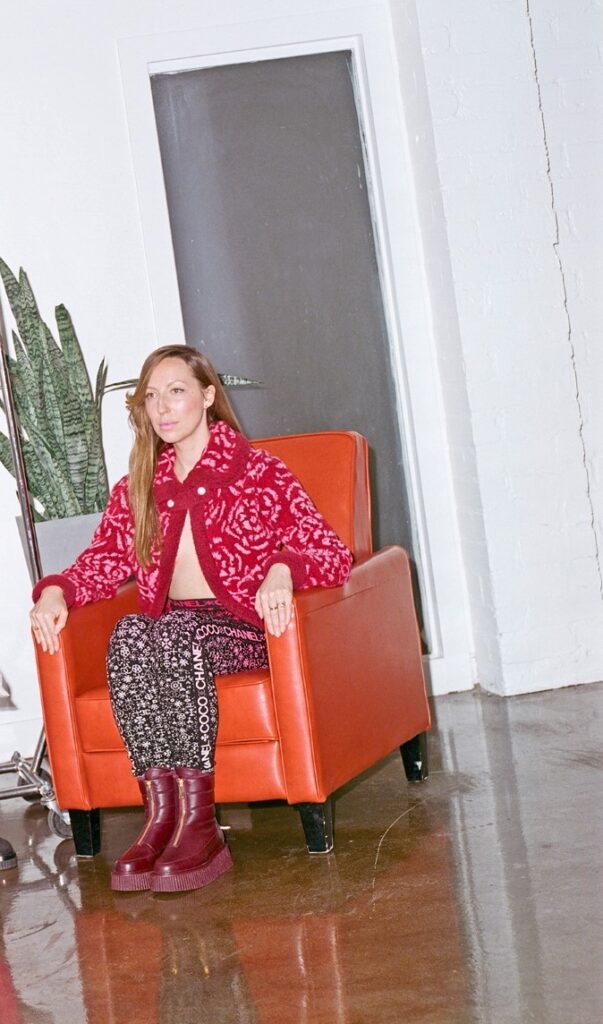
LA: On PEN15, I am so deeply in love with the way you hold people, in that raw place many of us have, the intense generosity toward those who are wounding and the wounded. There’s a saying, “Honesty without compassion is cruelty.” The level of honesty mixed with so much compassion, which you offer your characters and by extension to your audience – it’s astonishing. The capacity to go back in time, recognize these devastating moments and reframe them. Unlike a lot of shows dealing with the pain of adolescence, you’re not mocking anyone. But the humor adds an edge, yet the humor is so deeply loving.
Maya: Oh that’s such a deeply kind way to talk about our show, thank you for saying that. It is something we talk about a lot. I think especially in the third season we also tried to show Maya and Anna in maybe unflattering moments, in an unflattering light, because like you said, I think at that time you can go into one of two roles, you could be the bully or be bullied. And it’s a time of survival, so there are casualties in those moments. But it’s all coming either from places of insecurity or from all the big emotions that you feel at that age. I appreciate that you see that, because that was always a hard thing to navigate, we didn’t have enough real estate maybe to go into why certain characters are cool in moments at that age. So I’m happy you feel that way.
I think especially in the third season we also tried to show Maya and Anna in maybe unflattering moments, in an unflattering light, because like you said, I think at that time you can go into one of two roles, you could be the bully or be bullied. And it’s a time of survival, so there are casualties in those moments. But it’s all coming either from places of insecurity or from all the big emotions that you feel at that age. I appreciate that you see that, because that was always a hard thing to navigate, we didn’t have enough real estate maybe to go into why certain characters are cool in moments at that age. So I’m happy you feel that way.
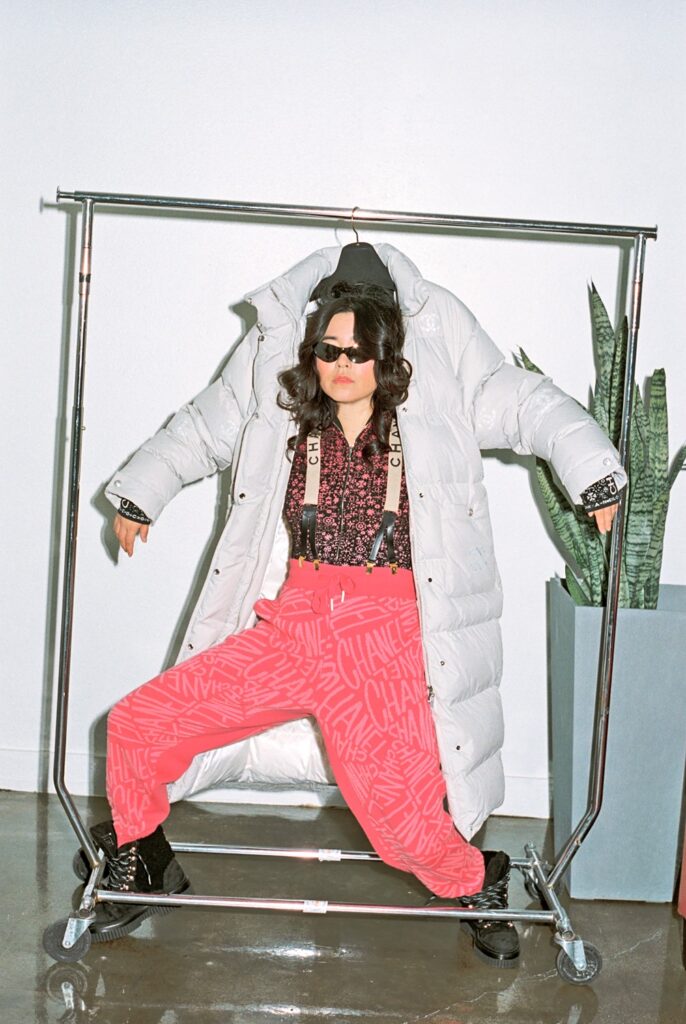
LA: It’s impressive in the portrayal of Maya, how you take the risk of portraying her at times as a brat. You trust the audience to understand all of what brought out that behavior – and to recognize and forgive their own actions, or their kids’.
[laughter]
Maya: Totally!
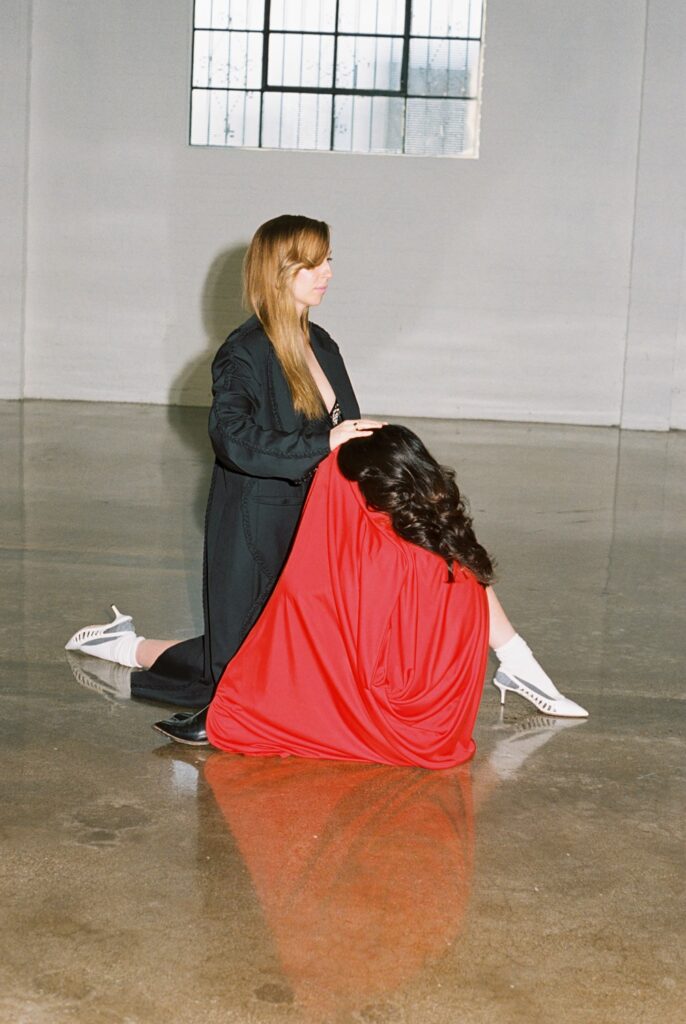
LA: And it’s poignant that Anna doesn’t have that luxury of being a brat, because she often has to parent her parents. There’s so many tropes and clichés we see again and again, which you went up against. If a child is going to be victimized, they better not be seen as bratty or selfish. But that’s not a realistic portrayal. You allow for the full humanity of these children, I’ve never seen that.
Maya: Yeah, yeah!
Anna: Maya you can speak to this even better because it’s your character. One of the things that I admire about Maya, which we wanted to infuse the show with, is that, when there’s truth involved and we’re trying to hold up a mirror to our memories and the truth of a full human, that means that our main characters can’t be… that it’s okay for them to fuck up, and it’s okay for them to, at moments in a story, be the villains – even though they’re our protagonists. Because that’s the compassion, every character has the capacity to do the wrong thing in moments – whatever that means. I think that’s the journey I’m still on as an adult. And the metaphor of playing 13, that these things we’re dealing with now have always been there, and disliking the parts of yourself that aren’t pristinely good, whatever that means, and sort of rewriting to the reject parts of ourselves, who are beautiful and acceptable, and the things that I’ve hidden, which may make some people cringe – we’re going to celebrate the fact that we’re the main characters in this TV show and not apologize for it. I think we took that to a further extreme this season.
Maya: Totally.
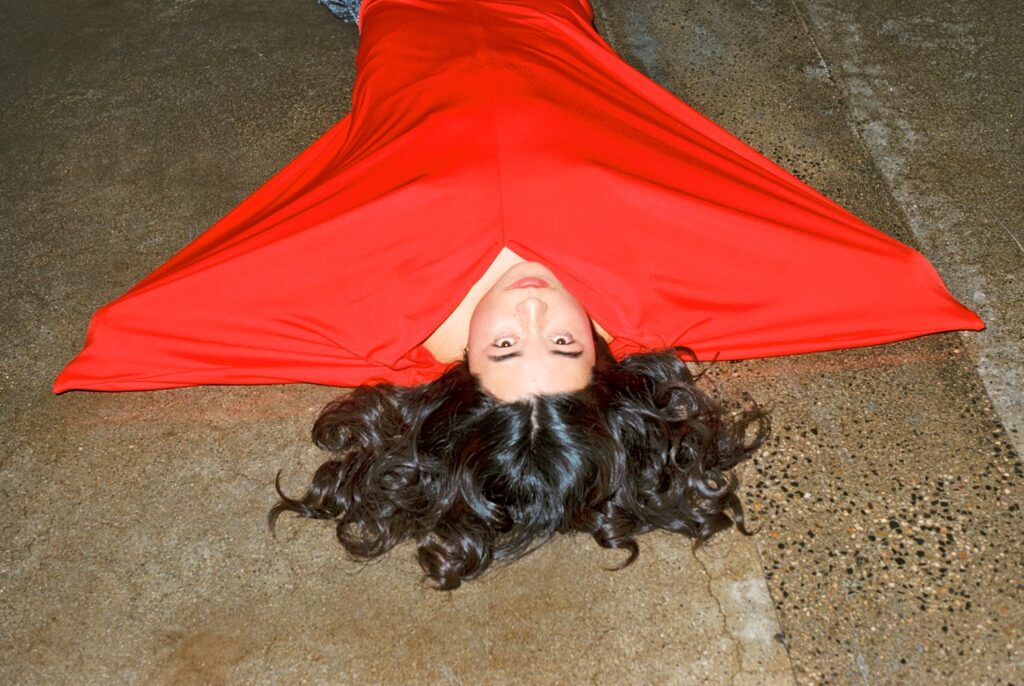
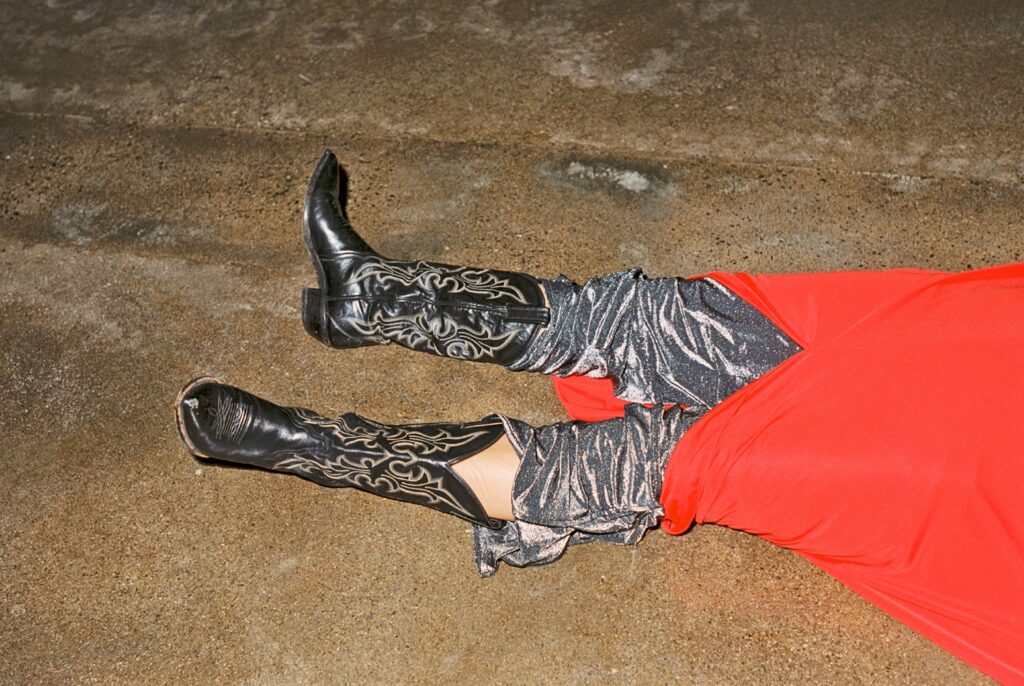
Anna: That was kind of nerve wracking, but we were excited about it. Maya’s character is a sort of quintessential representation of all of that, this person that, every time she puts on her wig, I’m like, That’s my little buddy, and I just couldn’t love her as that character, as Maya, any more for everything that is her.
Maya: That’s so sweet. If you were to show, for example the Bat Mitzvah episode and the scene of Maya flipping out with her mom about getting this expensive gift for her friend and not seeing the before and after, these small moments that lead up to that. Because from my mom’s memory of that time – she always talks about me when I was younger. She says, “You were so sweet and easy and then at thirteen you got hard.” Trying to go back as a sort of researcher, what were the moments that led to why I’d behaved a certain way or why we fought? The Bat Mitzvah episode was one condensed version of what I was going through, all the insecurity of my societal status and my race and everything built into like one identity explosion – and acting out about buying a gift as being the solution to all my problems. But from my mom’s perspective and her struggles with that, it was like, Oh my daughter’s changing, why is she becoming this brat that’s wanting an expensive gift? I feel grateful we got to show the before and after, what leads to moments like that. But it’s definitely still risky to show a character in all these shades. When I watch them, I feel like, Oh shut up Maya, you’re so annoying. But you know everything that happened, and hopefully there is room for a little understanding or compassion and recognition – oh right, she’s acting this way because of these compounding pervious moments.
Anna: And it’s also so funny! sorry to interrupt you!
[laughter]
Maya: I also think I haven’t seen an Asian American character like that in American TV. I haven’t ever seen like a kid that like her, a character that’s sexual, messy, funny, bratty, like all of these colors. I think that’s the luxury of TV, you get that space to play out all those nuances. I’m grateful we got to do that with our characters.
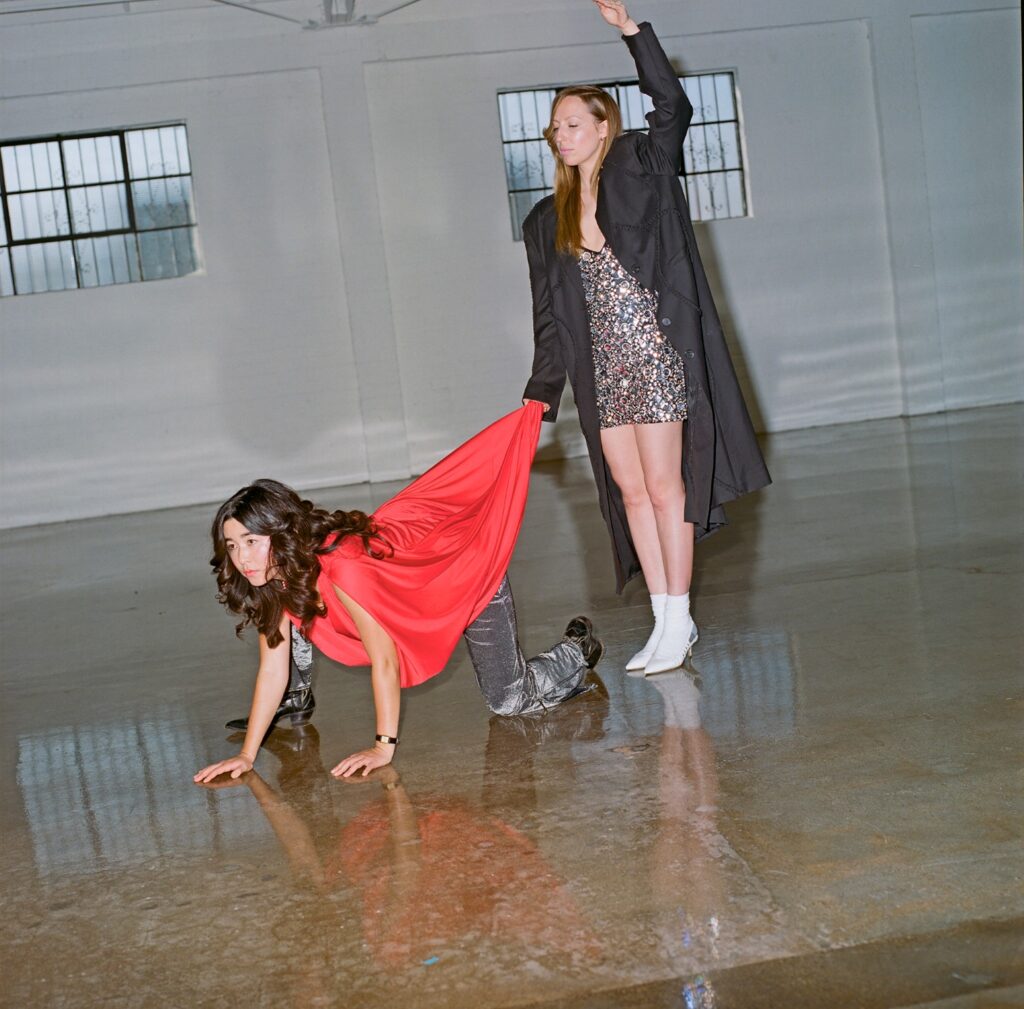
Left: Vintage dress Tab Vintage, Pants: Tom Ford Gucci at Tab Vintage, Boots & Watch Maya’s own; Right: Coat AnnaKikki, Dress Faith Connection, Socks: Target Heels Tamara Mellon
LA: I think PEN15 will be studied for its groundbreaking explorations of feminist identity, gender identity, coming-of-age sexuality, and the unique bond of female friendship at focus moment. Each episode is such a gem and has so many little pathways – like even Anna’s grandmother, the accepted racism and the way the kids just deal or are resigned to that, so many moments showing this is what it was like. Sarah Silverman spoke about living in the ‘70s, and what she called “over-sexualized, retarded adults.” She said the 1970s had the distinction of being “both naïve and inappropriate.” That’s the reality you capture, adults being naïve and inappropriate. Behavior of adults has improved, what is “allowed.” But kids are still so phenomenally cruel, maybe they just hide it belter. Ya gotta wonder if being cruel is just baked into how kids are. You both have babies, a daughter and a son, so I have to ask, do you think about sending them to school?
[laughter]
Maya : That is terrifying thought I’m kind of pushing off for a bit, because I’m not exactly sure where I want him to go to school. I want him to be around a diverse group of people and also have a good education. Finding that seems like a difficult task [laughter] in LA. But maybe not, I have no idea. I know Anna, you were talking about schools and thinking about that age. I don’t think I’m there yet. It’s almost like I’m going moment by moment, month by month with my kid right now.
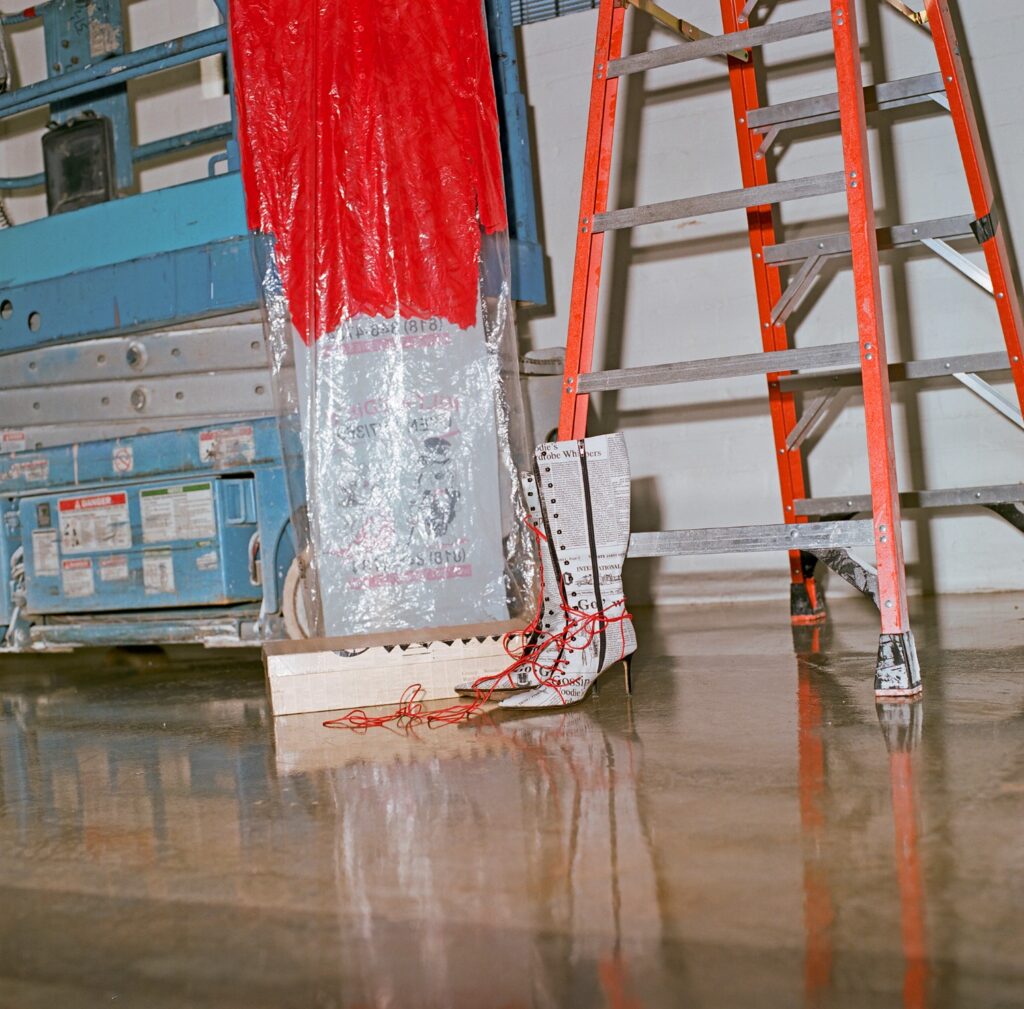
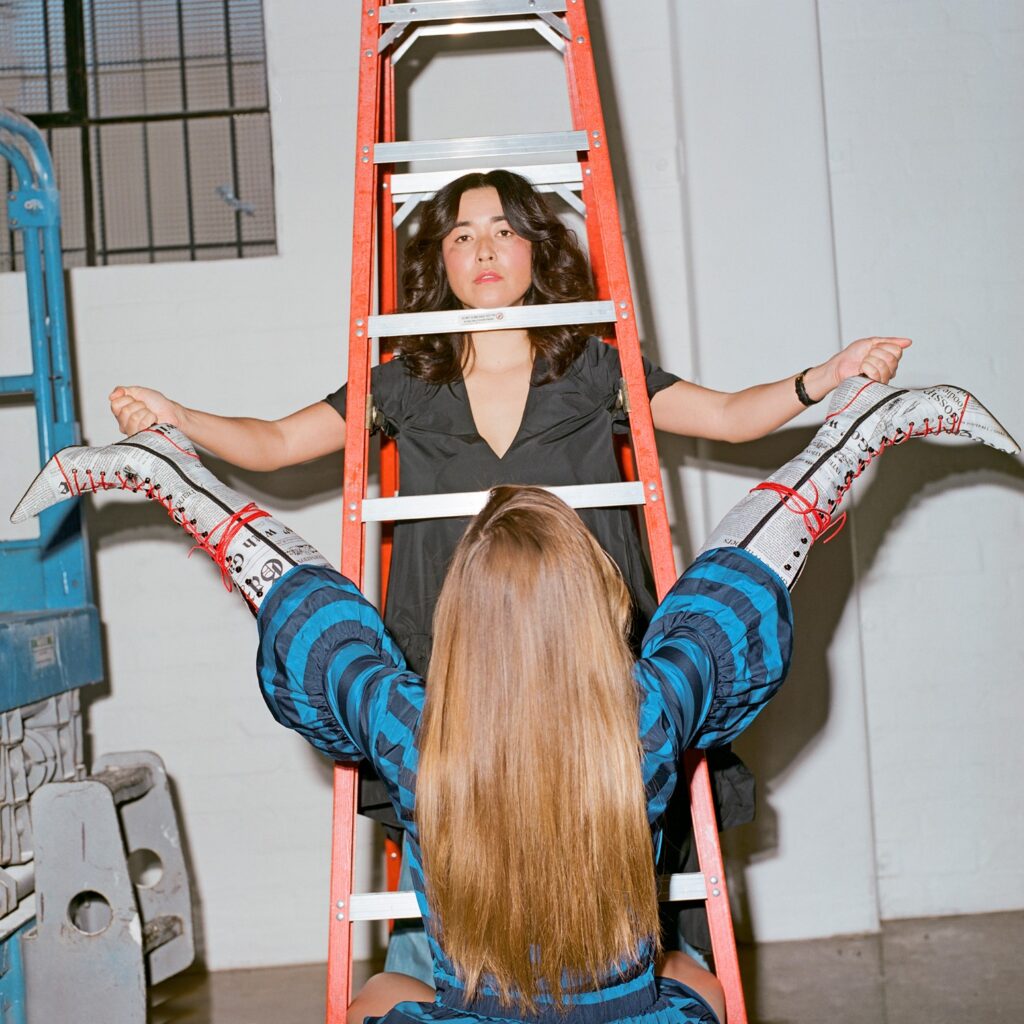
LA: They’re like one year old?
Maya: Yeah, eight and a half months, and Anna’s is ten and a half months.
Anna: There’s this fear definitely of social media because at the time we didn’t have that, so there’s a part of me that feels, if it was middle school in the year 2000, I’d be like, “Yeah, I got you!” But the more that I think about it, social media really scares me. But I think partly because of our show, we’ll hopefully be a little more decent at having them feel seen and heard at that age. I think society has changed a lot, but the propensity is to not see a kid or tween as a complicated prism of emotions and thorough sensitivities and feelings – as many colors of feelings as we have as adults. But without the coping tools to deal with them, which is where the humor and tragedy come from in our show. I hope that because I don’t feel more equipped, you know, for my kids. But I think as the show’s ending, for some reason I’m starting to digest more of what we’ve written. It has felt like academic study at times, those under-examined moments of that age. I think that is going to serve us, there will still be a million issues we don’t know how to deal with, I fully expect that. But hopefully, I won’t turn away or underestimate the depths of what they’re going through.
Maya: I feel like the show can serve as a conduit, even if it’s not being watched by our kids, it can hopefully, like you said Anna, remind us to be open and honest and create a safe space for them to talk about the things that they’re going through, because it’s a lot at that age.
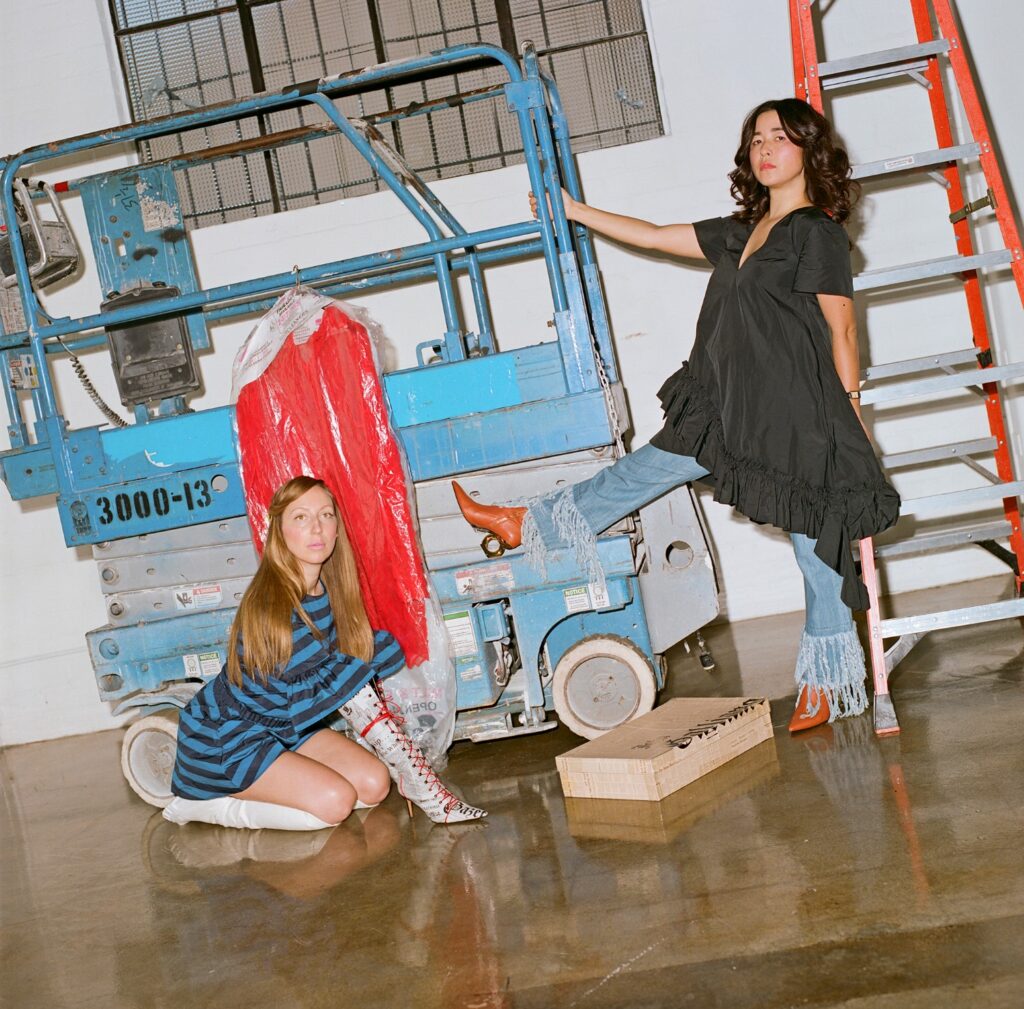
Left: Blouse and shorts: Red Valentino, white boots Annakikki, prop boots: John Galliano for Dior at Tab Vintage; Right Dress: Red Valentino, Jeans: Jean Paul Gaultier At Tab Vintage, Boots Kat Maconie, MAya’s personal watch: Cartier
LA: I agree. And I think our culture is getting provisionally better. I love the way you capture the shame of girls’ sexuality, but do not swerve away from showing it. In the third season Maya is not hiding under a blanket anymore, but in the bathroom, masturbating on the floor, without even a locked door… [laughter] …when her cousin walks in on her, but later says, “Me too, I do that too.” It’s so beautiful. If a girl masturbates, there is no camaraderie as has been portrayed with boys; with girls masturbating, it’s a joke, it’s shameful. I really related to the organic way you show having outsized overwhelming oppressive feelings or emotions but not having any tool box to express or name what this was. Like the date with Maya and her boyfriend, it’s going back to something that occurred and asking, Was that sexual abuse or rape? The language was not available to describe what was happening, the female agency of being in a situation and not being equipped. It’s empowering how you have gone back in time and have each other as support, but there are certain points where it’s too fragile, too painful – where they must be alone and cannot reach out to one another. That’s devastating.
Anna : Yeah the moment that comes to mind is the last episode of the series, after the blowjob. Maya telling Anna, right I’m okay, I’m fine and Anna trying to be happy for Maya but knowing in the pit of her stomach that something’s wrong and then just seeing Maya cry and try to recommit to her relationship with Derrick after that and try to be okay with it. That all felt really honest.
Maya: It’s more Anna’s character to keep pushing, to see if everything’s okay, and I think we ended up sort of going in this direction with both of them because both could be honest. Anna could keep comforting Maya, which is normally the role she takes, but it feels like she chooses a different way to comfort her because she herself doesn’t really understand what just happened or how Maya feels. And Maya is not ready to share at that moment. So that’s the way Anna is comforting her, by not pressing and just accepting where Maya is and being there. I didn’t quite have this exact experience, but I’ve definitely had experiences throughout high school and college of feeling very alone because you don’t have the tools or words to describe how you’re feeling, and there’s a ton of a shame that you don’t even know how to process yet. And you just want to feel positive about it because that’s what society is telling you, that if you’ve gone that far, that’s a good thing – “Oh you did that? Okay great, you made it to third base.” It’s all through the gaze of completing a base for the guy, as opposed to something for your own pleasure. It’s a lot of unpacking that will probably take that character Maya years.
That was a tough one, finding the line of what was the complete story we wanted to tell, and knowing also that it was the end of the series and if we went further than that… I feel that it deserves so much time and space and energy to talk about it, and knowing we had one episode left and feeling like it wasn’t enough. But we wanted to honor the experiences, and there’s a few moments with these cat-calls, the references of older men. The reality is that started when I was thirteen, walking down the street and there’d be a guy in his twenties or something that would say something. Yeah, that was normal. It did not feel dangerous to me typically, it was normalized. I was even made to feel like that was a good thing when that happened. That meant I was wanted and I was good enough and all of that. That lays the groundwork for abuse and wanting to honor that experience. And also we knew that we wanted the characters to come home by the end of the series, to be sort of back at the beginning and to be safe after this massive loss of innocence that they go through. It was really a walk on the line, I think.
LA: Just allowing for that conversation is novel, which is insane. The episode that was the most chilling and terrifying, while also moving for me, was when the girls run away from home. We’re watching knowing how stepped in innocence these girls are while plowing toward a cliff of disaster. When Anna goes into that room with the “model scout” but Maya gets that something is off… And we as an audience know there’s no coming back from that kind of damage. It felt like an action movie where you’re jumping out of your chair shouting, “Run! Get the fuck outta there!” When Maya’s brother comes on his bicycle to bring them home, that left me in tears. There is incredible power in how you show, no matter how safe your family is, there are these dark forces that a kid, steeped within their rich fantasy life and colliding with complex desires to belong to this adult world they don’t fully comprehend, can slip so easily into – there’s a horrific realm that’s waiting for them. That episode brilliantly shows how possible that disaster is, especially for girls.
Anna: That was a tough one, finding the line of what was the complete story we wanted to tell, and knowing also that it was the end of the series and if we went further than that… I feel that it deserves so much time and space and energy to talk about it, and knowing we had one episode left and feeling like it wasn’t enough. But we wanted to honor the experiences, and there’s a few moments with these cat-calls, the references of older men. The reality is that started when I was thirteen, walking down the street and there’d be a guy in his twenties or something that would say something. Yeah, that was normal. It did not feel dangerous to me typically, it was normalized. I was even made to feel like that was a good thing when that happened. That meant I was wanted and I was good enough and all of that. That lays the groundwork for abuse and wanting to honor that experience. And also we knew that we wanted the characters to come home by the end of the series, to be sort of back at the beginning and to be safe after this massive loss of innocence that they go through. It was really a walk on the line, I think.
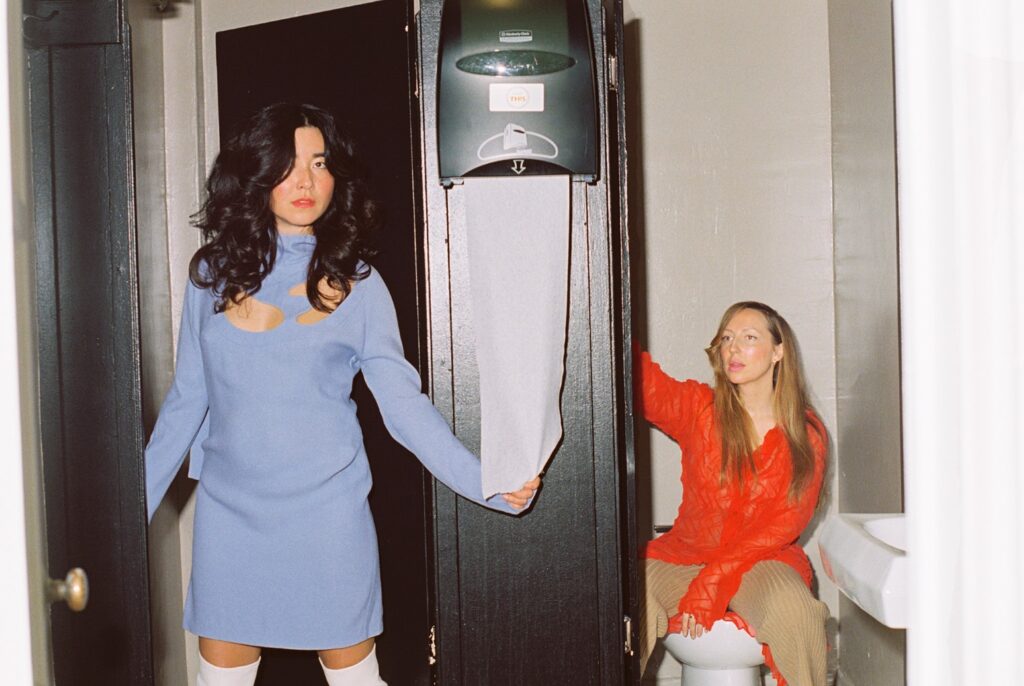
Left Dress: Celine Paris at TAB Vintage Boots: AnnaKikki; Right: Blouse Issey Miyake at Tab Vintage, Pants: Mandkai, Boots: Sportmax
LA: I think putting it in terms of power, the idea of being a model was the ultimate of being seen, but now girls want to be influencers because that is power. And that will somehow make you real…
Anna: I know, that’s just so devastating when you say it like that. Ι haven’t thought about it in exactly in those terms, they’re craving power and validity of being a full human being as a girl or a woman or whatever, if you’re a model and if you rise to that status and if your stomach looks at a certain way, your body, your face – ultimate female, you know like five stars female! [laughter] And now there’s influencers – it just gives me the chills. I don’t steep super-deep into social media, and Maya, I don’t speak for you, but it doesn’t seem you do either. Just thinking about it like that and how you know because for me that became a semi-real story, and it ended up being pretty much a scam, being like “scouted” on the street and feeling such massive validation; but also how hard it was, that was sort of, that’s not going to happen often. In suburbia there are not these big model scouts. We went into Boston one day and there was this random person – and when you said that, I think of the kids on the internet now and just imagine myself at thirteen, only now, and seeing other kids making millions of dollars being influencers, that being possible on this level. It’s just in a way that I didn’t really think that being a model was, that it was still somewhat unattainable, and then you see these kids in their living room just doing it, and all of a sudden their life totally changing and being about how many followers… And it just seems like what we’re talking about modeling on crack times a million, and how difficult it is and how much more difficult that must be and how much more difficult this can be to feel worth something these days.
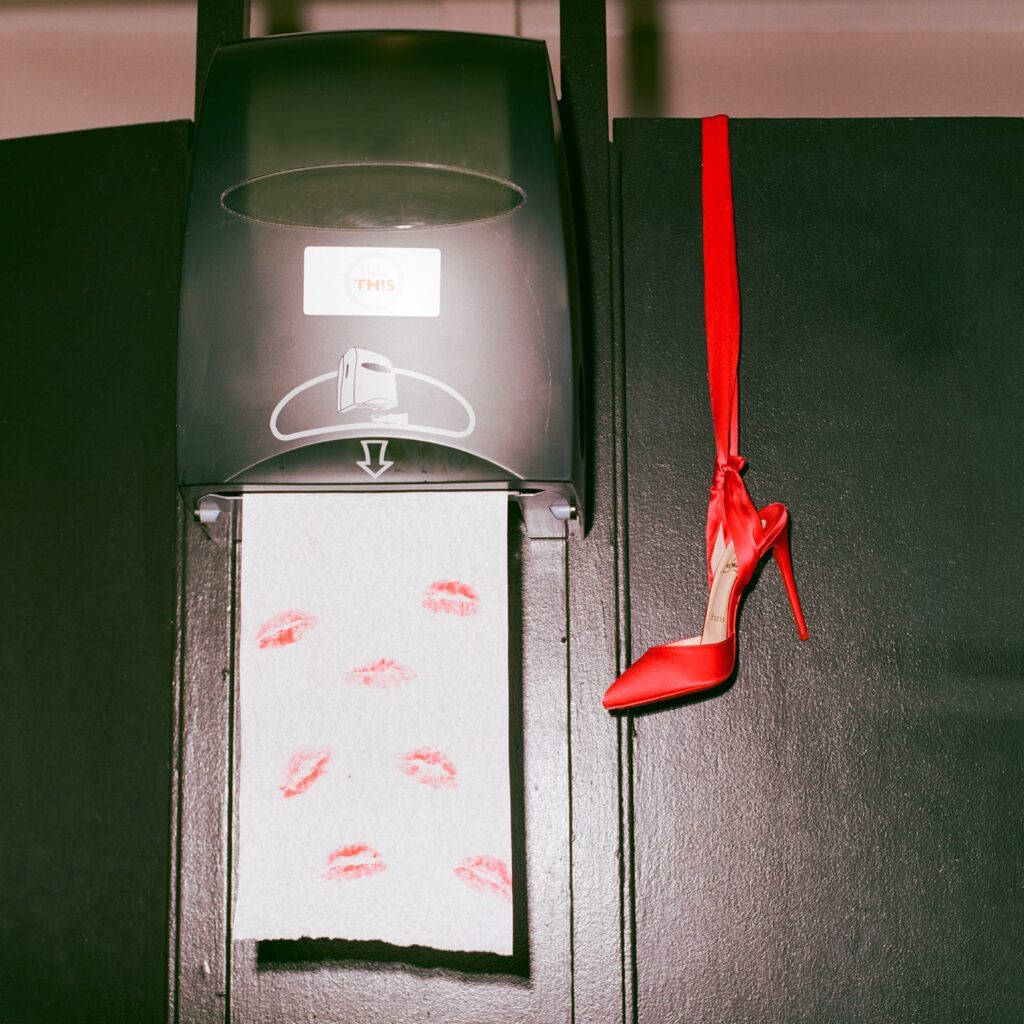
Heels: Christian Louboutin
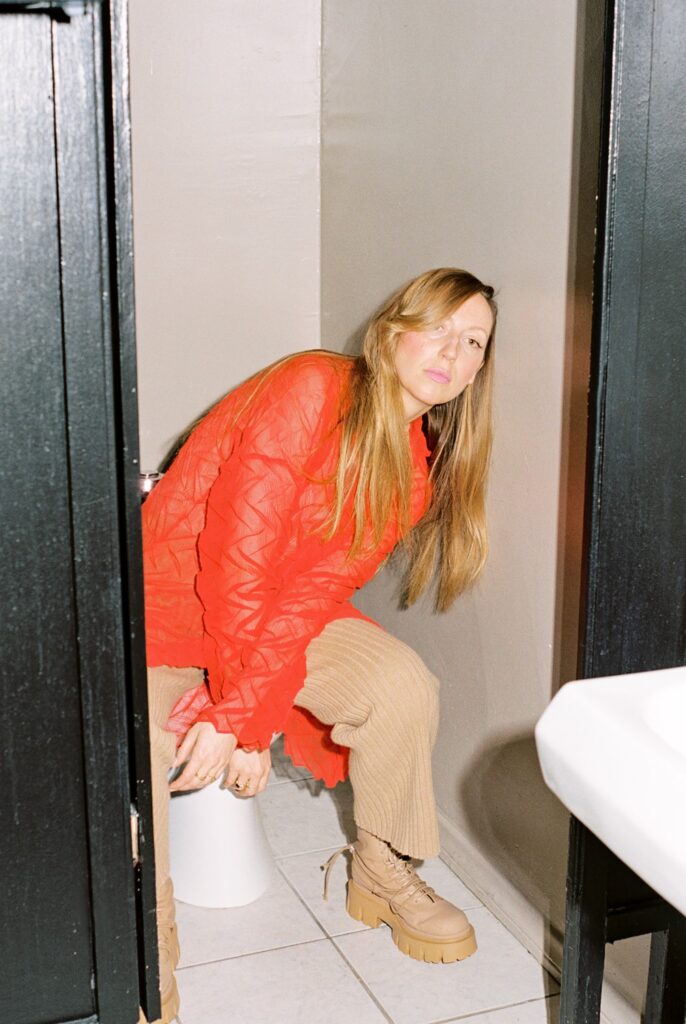
LA: The generosity towards Maya and Anna’s parents bring to mind “Late Poem To My Father” by Sharon Olds, these last lines, which I think you’ll relate to, and Anna especially I read about you having lost her father while making PEN15.
And what they did to you
you did not do to me. When I love you now,
I like to think that I am giving my love
directly to that boy in the fiery room,
as if it could reach him in time.
Anna: Well let me just respond to that, because that’s just so beautiful and thank you for sharing that. That resonates on a lot of levels, one in terms of almost wanting to take care of your parent, which is definitely in the show, and learning later after lots of therapy that it’s not how it’s supposed to go, and then at the same time having anger – I didn’t talk to my dad, I didn’t see him for five years because as I got older and went to therapy I was like, Oh I’m pissed, I’m mad and I need this from you. And that was hard. And then eventually finding empathy and understanding exactly that, comprehending what he went through and actually what I received being a much lighter iteration and appreciating that of him. And then wanting not to repeat the things that I didn’t like with my child. So yeah it’s a very deep thing. And I think PEN15 – and Maya, I don’t want to speak for, you can speak for yourself – it has definitely been therapy – the most expensive therapy, I’ve been saying, ever. It’s a way of really examining what was hard and what wasn’t, and we get to try to do better for our kids too. Or do the same when the thing that they did great.
Maya: It’s something that is going to keep healing us for years. As time goes on, the processing and looking back, I’m still learning some things even after having made it. While making it you’re so in the throes of production that you’re kind of not realizing how much you’re absorbing or what is going through you as you make the show. As days pass, I’m like, OH! I get hit every week or so by something when I examine it or read an article about it or talk to someone like you about it. This is going to be a very special gift for us, the kind that keeps opening up new revelations and catharsis. I read an article the other day about that, it brought a new healing to my identity that I never really felt even while making it. But through making it, it brought us there, and so thank you also for sharing.
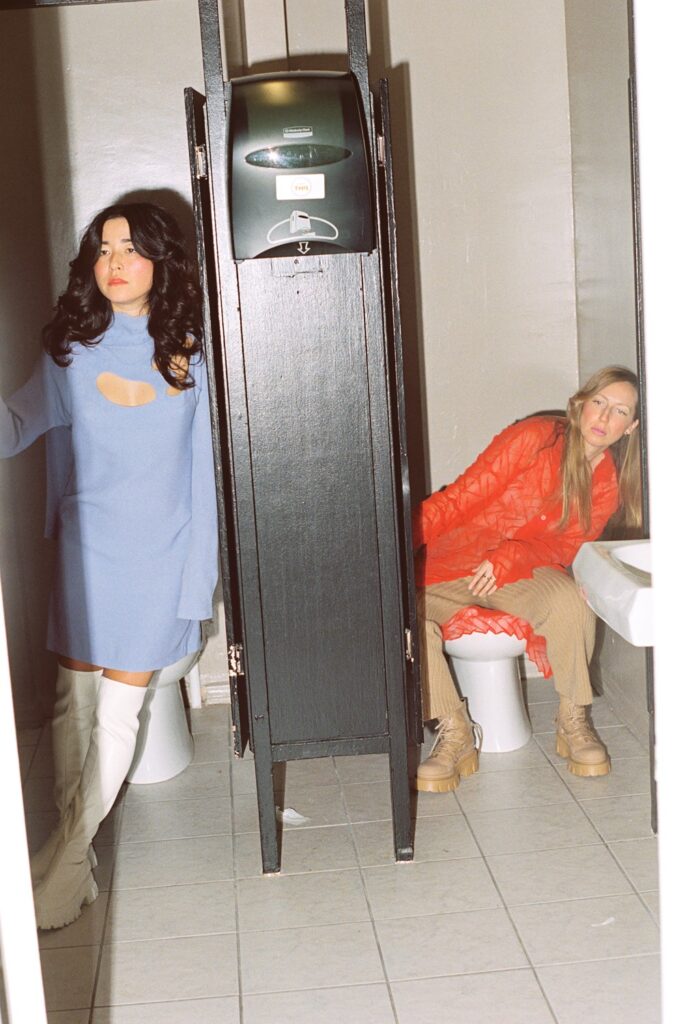
Left Dress: Celine Paris at TAB Vintage Boots: AnnaKikki
Right: Blouse Issey Miyake at Tab Vintage , Pants: Mandkai,Boots: Sportmax
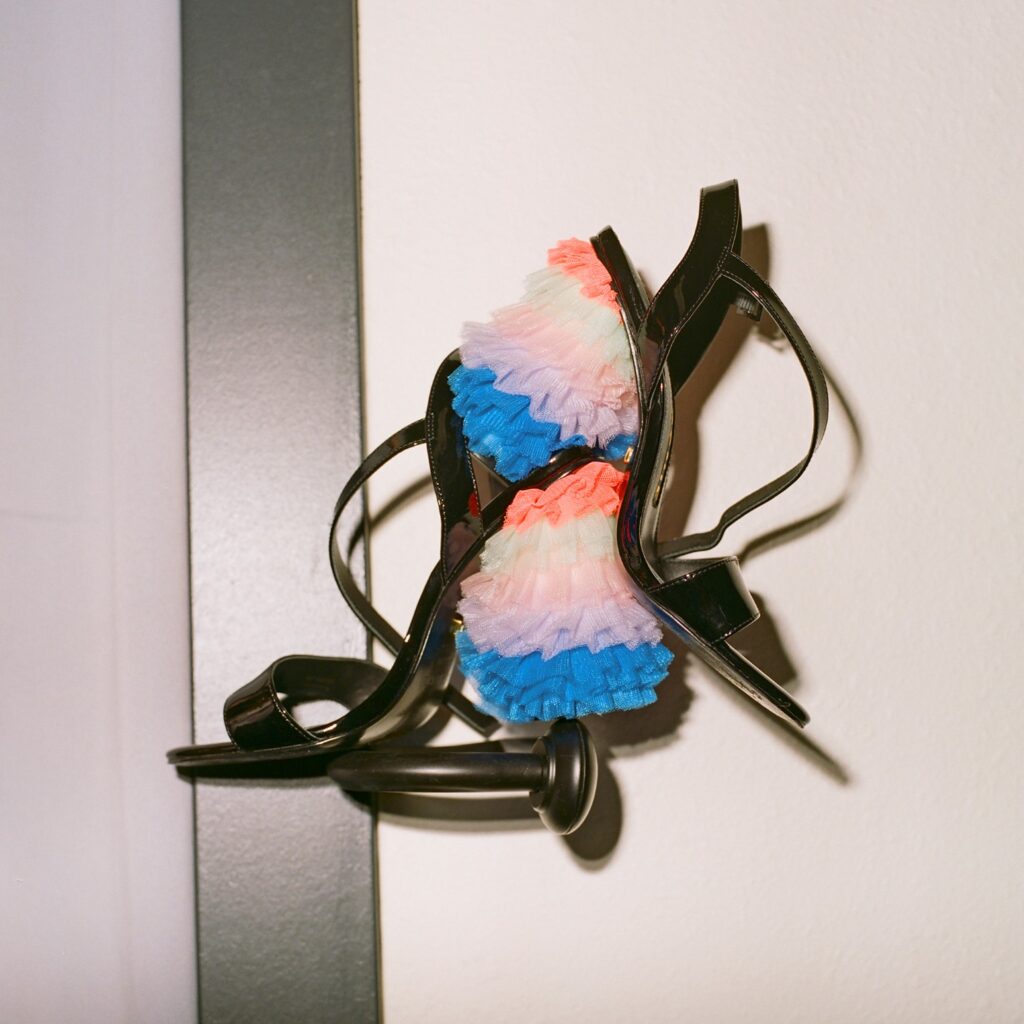
Heels: Kat Maconie
LA: The love Maya and Anna have for each other reminds me of the family that can form on a movie set. There’s just something about when you’re playing or creating really intense roles, this experience of “I love you forever, you’re my best friend,” and you become family with crew and the craft truck folks. And then suddenly you’re onto the next project and you have to accept, wow this is not my forever family. It always goes back to those primal childhood relationships, like Maya and Anna have.
Maya: It’s so funny, I read an interview with Jenna Fischer and John C. Reilly, they starred in Walk Hard: The Dewey Cox Story, and they all bonded and it was like a family and then as soon as it ended, she was like, Okay great so see you guys next week, and John C. Reilly is like, the love is real but we have our lives to return to – the movies, it’s like this fantasy summer camp where you are together all the time when you’re working so hard to create something, and you bond but then it isn’t real life. But it also informs your real life, in some ways more. It’s just odd.
LA: It’s devastating when the film family breaks up!
Maya: Yeah she was very upset.
[laughter]
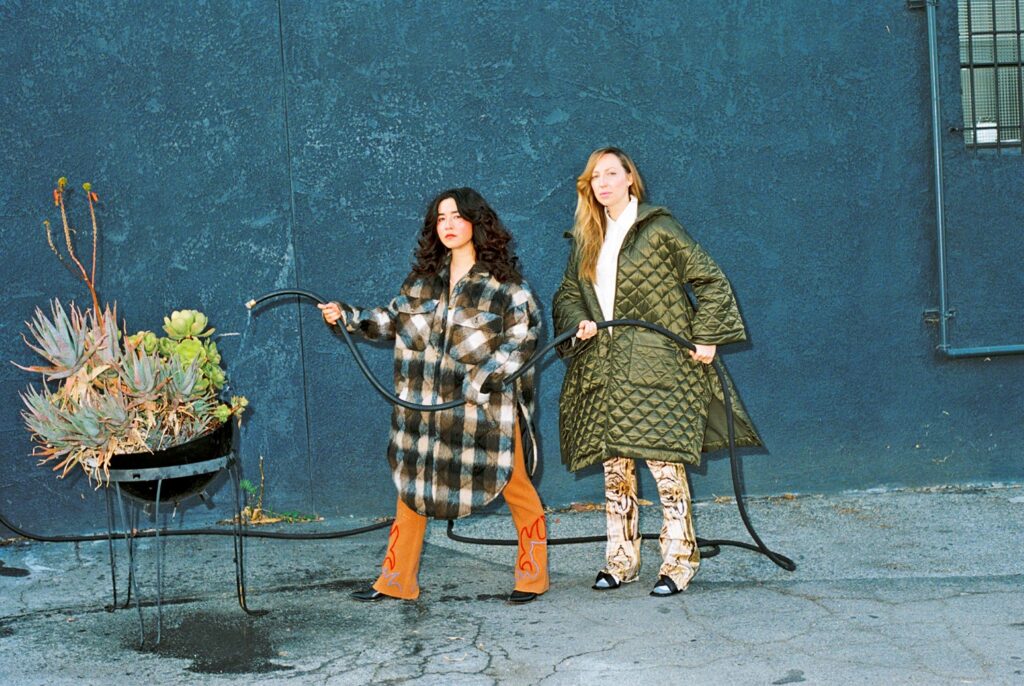
Left: Coat Faith Connection, knit pants Mandkai, Boots Maya’s own; Right: Blouse AnnaKikki, Coat: 8 by Yoox, Pants: Alexander McQueen at Tab Vintage, Heels: Kat Maconie
LA: How are you navigating that red carpet trip? Whenever I would have to do a red carpet there’s a big part of me that just gets really angry…
[laughter]
Anna: That struggle between, you know so intentionally in our show not wearing makeup and adding facial hairs and showing sides of ourselves that we think just putting on TV in itself is important and interesting and a kind of response to the patriarchy in a way. And then you do a red carpet and all of a sudden I’m like sucking my stomach, just in a more clever way, putting my arm over my stomach and not hunching as much but doing a different angle for the camera or whatever. So, yeah, I have not found my voice, or my authentic self in the way I have in Anna Kone, I’m working towards that. I’m aware of and it’s a conversation but I have not found it.
[laughter]
Maya: I couldn’t agree more, you know recently we had the option of getting to dress up as a character is for a talk show versus dressing up and putting on an outfit and hair and makeup and glam for a talk show, and it was so fun and the most freeing and where I felt my most authentic self – even though I’m playing a character – but I had no nerves. So it’s interesting to think of it like a character. I definitely have not found my authentic self on the red carpet, but is there a character that in a way feels authentic or free? I don’t know, because putting on makeup and hair instantly makes me feel like a doll. If I make a wrong move, the lipstick will not look good anymore – and why would I care, no one else cares you know? But it’s exactly like you said Anna, hyper-focusing on these details of like, oh if I suck in, or if I do this, the picture won’t look good. And the picture never looks good, and then I get in my head, it is going be a journey and we’re at the beginning of it, that’s for sure. I’ll speak for myself Anna, [laughter] I’m at the beginning of it.
Anna: Yeah and you know PEN15 didn’t come from two perfectly evolved women. There’s a part of me of course that I’m, “Hey, I’m gonna arrive on the red carpet with or without makeup,” I think about that. Is that more authentic to who I am right now? Not exactly, but it is me arriving in full glam authentic? No. That question tortured me a little bit, and also I look back on like when PEN first came out and feeling like, Why did I…? But it was such a massive opportunity, we have been waiting tables for five years, four years before that. And I love dresses and I love hair, but at the same time it’s torturing me, Why am I doing this? And it comes from that juxtaposition within us, me and Maya, we’re real people, adults that are you know still grappling with some of those same things that we’re trying to authentically look at on the show. But it’s not like we’re past any of that. But I want to be.
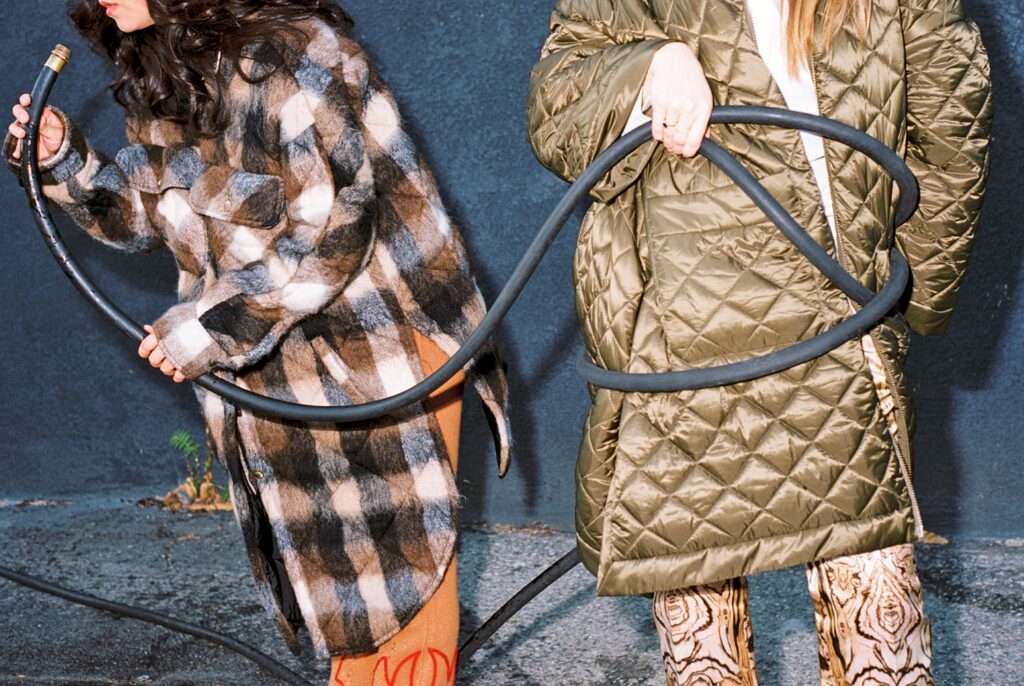
LA: It gets very meta when so much of what the word is about as not being seen and then you’re on a red carpet and hear everyone call your name, and you know and it’s very like, Where am I and what is this, how do I navigate this? I can understand why for so long Sacha Baron Cohen would not go as himself.
Maya: I still feel more like I’m in middle school when I’m at red carpet events than anywhere else. Only because they don’t call out my name, they don’t want to take a photo of just me – no, next! And it’s like, Whoa, I’m so disposable here. It’s just another hierarchy all of a sudden.
Anna: Thank you for the most thoughtful questions. You made me think of things in a different way that I hadn’t. It was really fulfilling and it very rarely happens, so thank you.
Maya : Thank you very much!
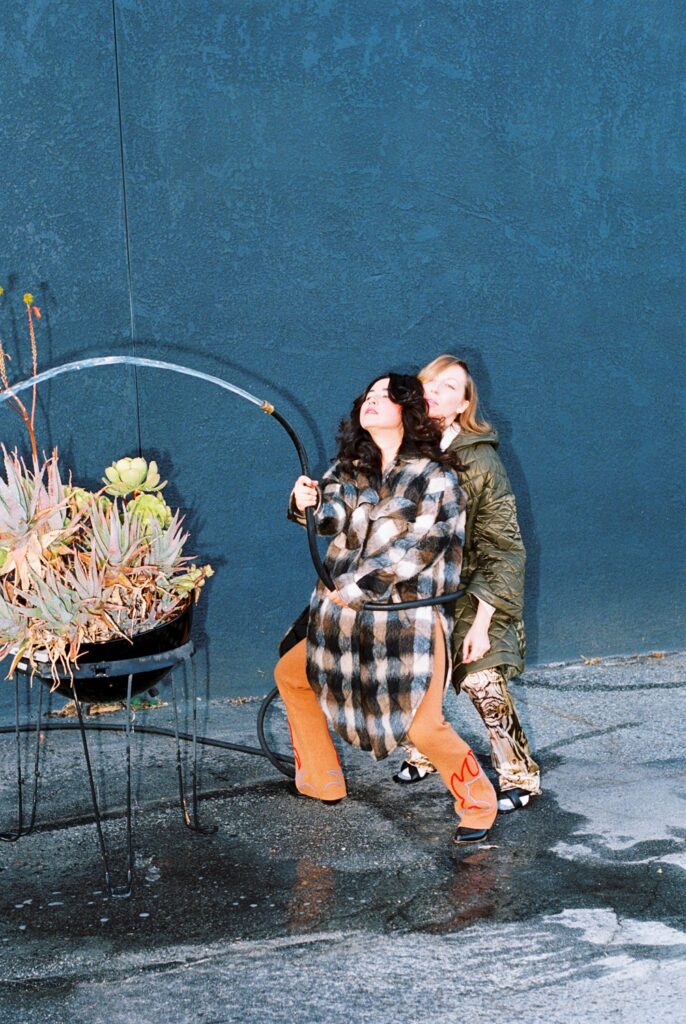
Left: Coat Faith Connection, knit pants Mandkai, Boots Maya’s own; Right: Blouse AnnaKikki, Coat: 8 by Yoox, Pants: Alexander McQueen at Tab Vintage, Heels: Kat Maconie
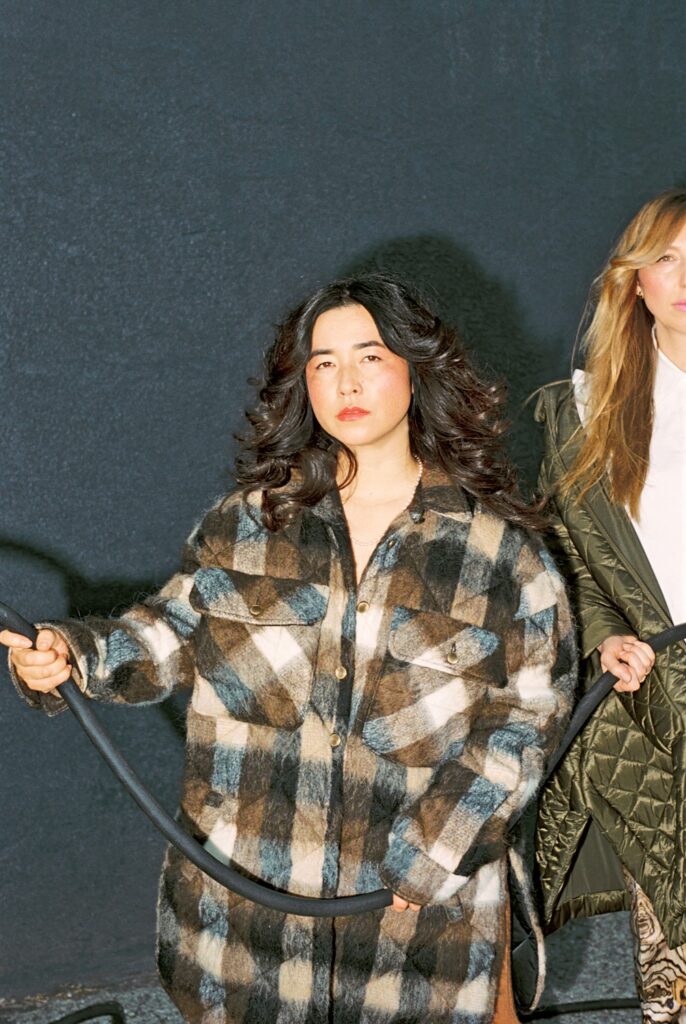
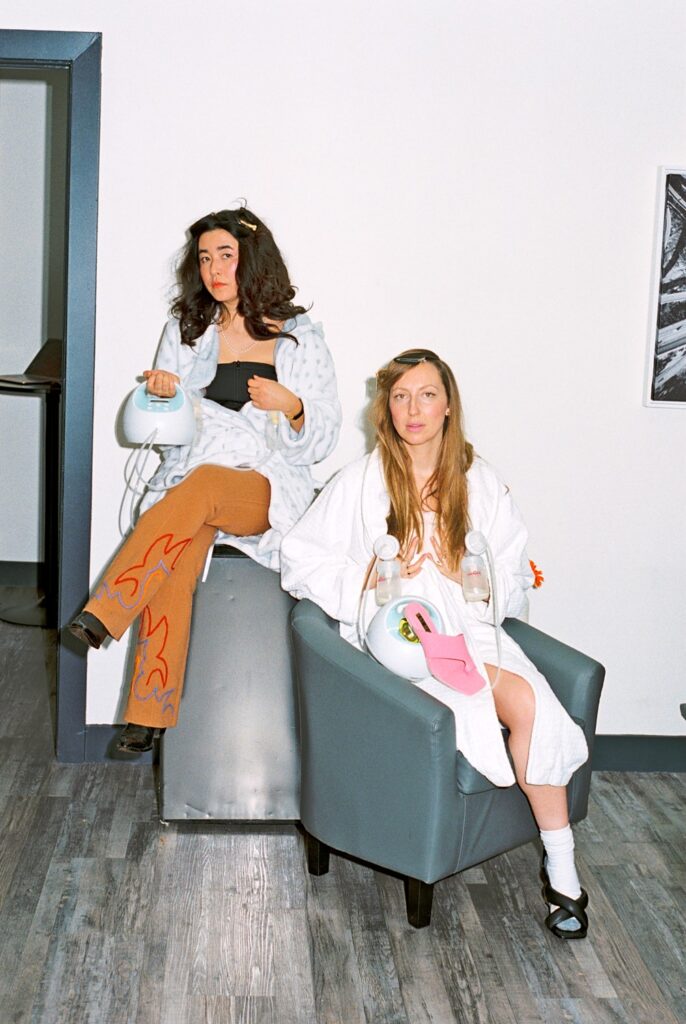
Photography
Maya Fuhr
Fashion Editor & Casting
Deborah Ferguson
Interview
Laura Albert
Makeup
Loren Canby @A-Frameagency
Hair
Eddie Cook @ ForwardArtists
Fashion assistant
Juan Marco Torres
Photography Assistant
Hadley Rosenbaum
Web Layout
Tori Smith
Location provided by
Stage This LA
Thank you Narrative PR & HULU
